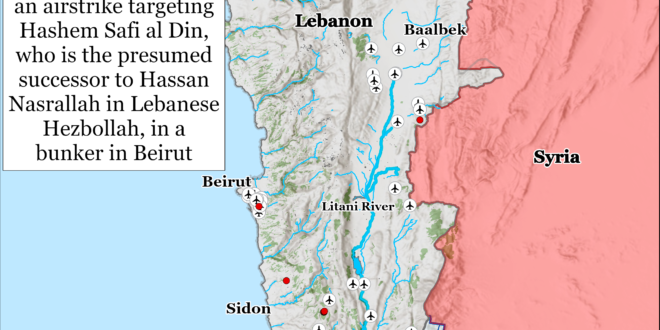The Israel Defense Forces (IDF) conducted an airstrike on an underground bunker in Beirut on October 3. The airstrike targeted a meeting of senior Hezbollah officials, including the presumed successor to Hassan Nasrallah, Safi ed Din.[i] Neither the IDF nor Hezbollah have provided any information on the outcome of the strike. Hezbollah Deputy Secretary General Naim Qassem said on October 1 that Hezbollah will choose a new leader as soon as possible and according to the approved mechanisms.[ii] The chief of Hezbollah intelligence may have also died in the airstrike.[iii]

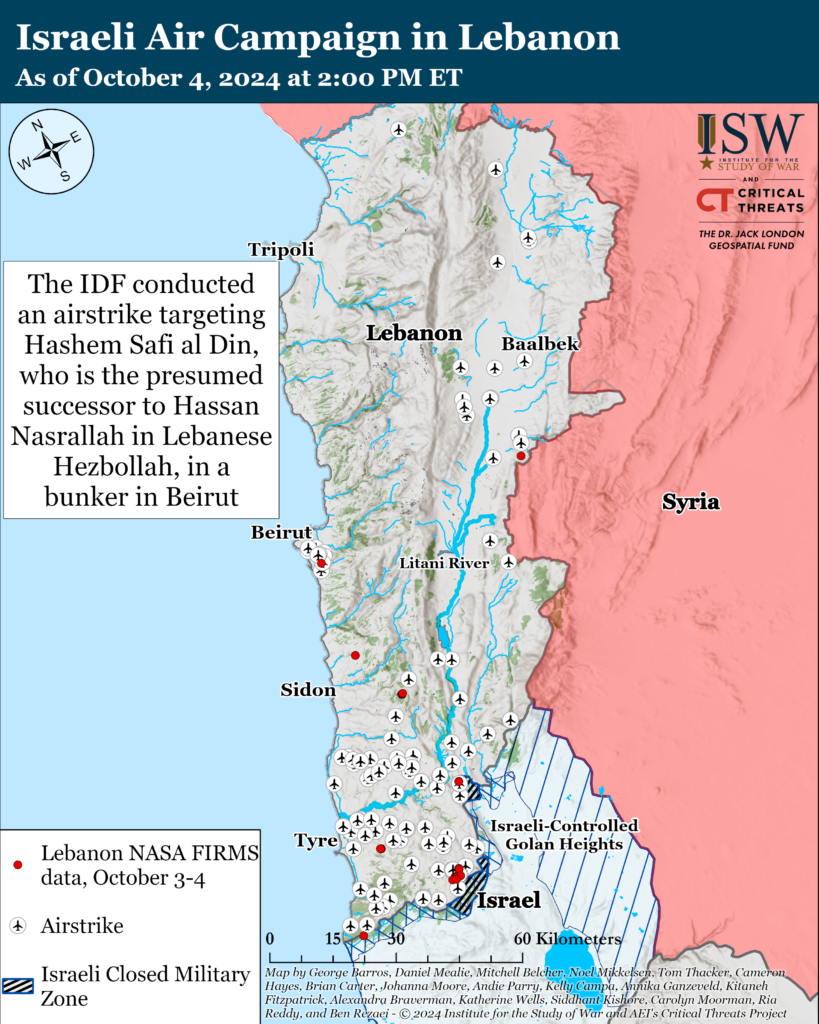
This map illustrates individual Israeli air and artillery strikes based on local Lebanese reporting. This map depicts strikes reported from 2:00pm ET on October 3 to 2:00pm ET on October 4. This map is not exhaustive. CTP-ISW cannot independently verify the locations of Israeli strikes.
The IDF continued its campaign to destroy Hezbollah military infrastructure in southern Lebanon. Geolocated imagery indicates that the IDF has continued to advance into Yaroun around the western axis of advance.[iv] The IDF 188th Armored Brigade (36th Division) raided Hezbollah positions in the surrounding area and seized dozens of weapons, including anti-tank guided missiles, explosive materials, rockets, and rocket launchers.[v] The IDF has reportedly discovered significantly more Hezbollah military infrastructure than it expected during the raids.[vi] Senior Israeli officials said that the clearing of the Lebanese towns is meant to eliminate the threat that Hezbollah ground forces pose to civilians in northern Israel.[vii] An anonymous Israeli official said that the area will no longer be “springboard villages from which the Galilee can be raided,” referring to Hezbollah‘s long-term plan of launching ground attacks into Israel.[viii] An Israeli military correspondent reported that the IDF progress in southern Lebanon has been ”relatively slow” due to the hilly and rough terrain.[ix]
The IDF has continued targeting tactical-level Hezbollah commanders in southern Lebanon, which may be diminishing the combat effectiveness of some Hezbollah units. The IDF stated that it has killed 20 Hezbollah field commanders in southern Lebanon since September 30.[x] These commanders have included five brigade-level commanders, ten company commanders, and six platoon commanders, particularly around the western axis of advance.[xi] Israeli sources reported that Hezbollah units in southern Lebanon remain organized but that the IDF has observed ”signs of erosion” in these units due to the killings of field commanders.[xii] Hezbollah forces remain structured as a conventional fighting force and should in principle be able to overcome any temporary disruption caused by the loss of commanders. CTP-ISW will continue to assess Hezbollah combat effectiveness in the days and weeks ahead.
Hezbollah attacked Israeli forces advancing across southern Lebanon.[xiii] Hezbollah claimed that it detonated three improvised explosive devices (IED) targeting Israeli forces around Maroun al Ras.[xiv] Hezbollah also claimed that its fighters monitored and tracked Israeli troop movements and planted IEDs near Maroun al Ras and Yaroun along paths that Hezbollah expected the IDF to pass.[xv] Hezbollah also fired rockets at Israeli forces west of Yaroun.[xvi] Hezbollah separately claimed that it engaged Israeli forces in several villages around the eastern axis of advance.[xvii]
The IDF Air Force has supported Israeli ground operations by conducting airstrikes to isolate Hezbollah units. An Israeli military correspondent reported that the IDF has targeted Hezbollah cars and roads heading to the Israel-Lebanon border in order to obstruct Hezbollah reinforcements.[xviii] Local Lebanese sources similarly reported that an IDF airstrike has prevented travel between Hasbaya and Marjayoun districts.[xix] The IDF has separately conducted airstrikes in recent days targeting border crossings and tunnels around the Lebanon-Syria border in order to prevent weapons transfers to Hezbollah.[xx]
The IDF Arabic-language spokesperson called on civilians to evacuate immediately from 35 towns and villages in southern Lebanon on October 4.[xxi] The spokesperson told residents that they should head north of the Awali River.[xxii] The IDF asked residents to evacuate areas within Tyre City limits for the first time.[xxiii]
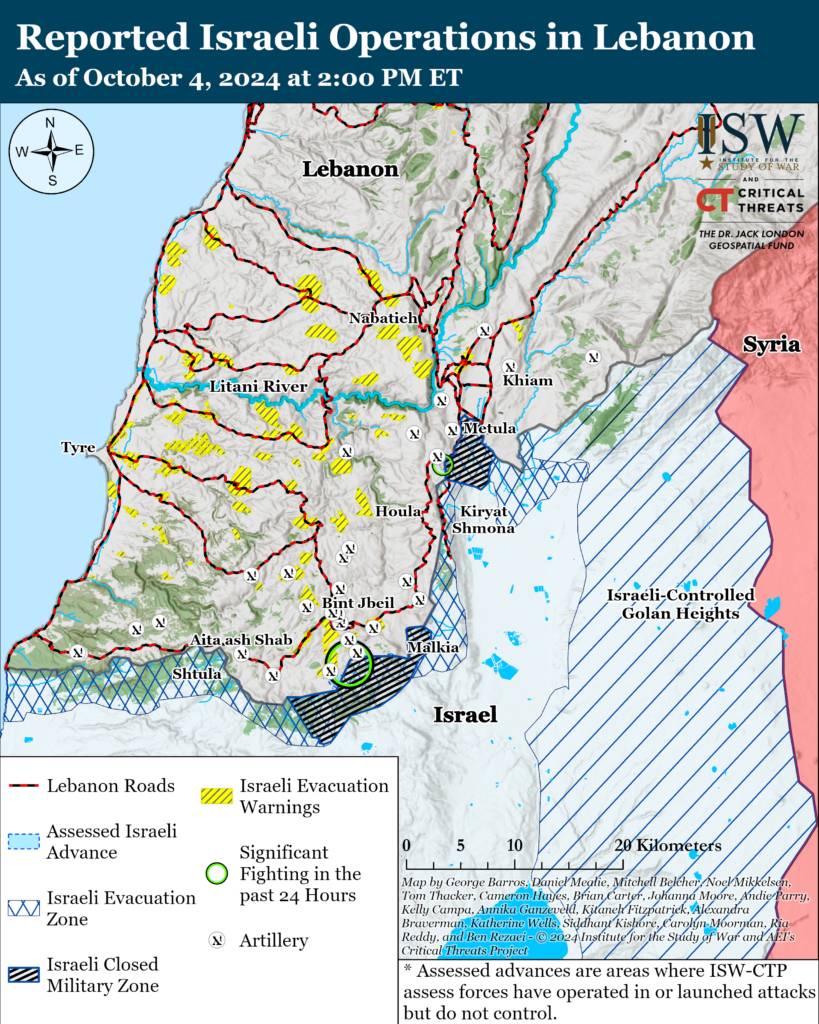
Hezbollah continued its attack campaign targeting civilian and military locations in Israel. Hezbollah has conducted at least fourteen attacks targeting locations in northern Israel since CTP-ISW’s last data cutoff on October 3.[xxiv] The IDF detected a barrage of around 70 rockets launched from Lebanon into Israel.[xxv] Hezbollah fired medium-range Fadi-2 rockets targeting the IDF Nasher base east of Haifa.[xxvi] Hezbollah also launched about 40 rockets targeting Karmiel.[xxvii] The IDF intercepted most of the rockets, but some landed in open areas.[xxviii] Hezbollah also continued to attack Israeli troops concentrated around the Israel-Lebanon border, including by firing large barrages of rockets targeting Israeli armor and infantry in Kiryat Shmona, Sasa, Avivim, and Kfar Giladi.[xxix] Hezbollah also fired an anti-tank missile targeting Israeli armor in Malkia.[xxx] These five towns are located within or adjacent to the IDF’s two closed military zones in the Upper Galilee, from which the IDF has launched its raids into Lebanon.
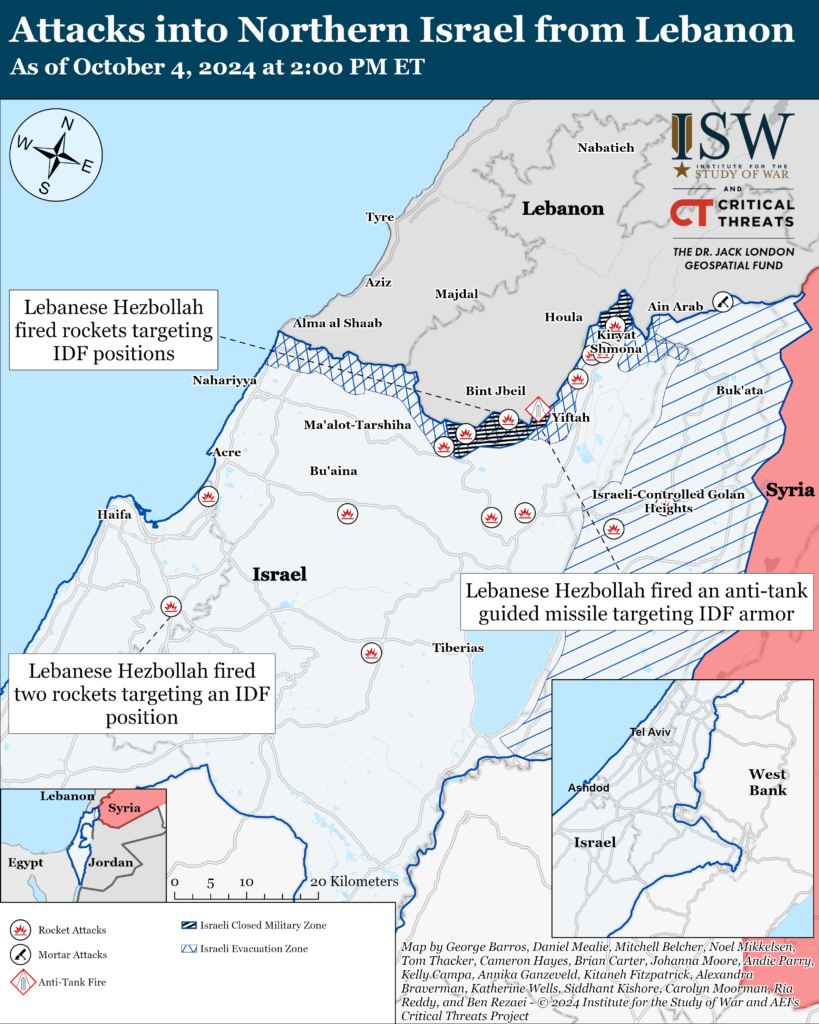
The United States is considering pushing for Lebanese Parliament to elect a president in the coming days, according to US officials speaking to Axios.[xxxi] US officials reportedly believe that Hezbollah influence in the Lebanese political system can be reduced while the group leadership is weak and its forces are pre-occupied fighting the IDF. Lebanon has not had a president since 2022, largely due to Hezbollah’s refusal to support any candidate other than its ally, Suleiman Frangieh.[xxxii] Hezbollah ally and Parliament Speaker Parliament Speaker Nabih Berri indicated openness to choosing a president shortly after Nasrallah’s death.[xxxiii]
The Islamic Resistance in Iraq—a coalition of Iranian-backed Iraqi militias—likely launched two one-way attack drones targeting IDF positions in the northern Golan Heights on October 4, killing 2 IDF Golani Brigade soldiers and injuring at least one additional soldier.[xxxiv] The IDF intercepted one drone, but the second hit an Israeli base due to a failure to detect the drone and properly alert Israeli forces at the base, according to Israeli media.[xxxv] The IDF stated that the attack injured one IDF reservist.[xxxvi] The IDF did not clarify how the two Golani Brigade soldiers died and the other soldier was injured.[xxxvii] Israeli media reported that the drones were launched from Iraq.[xxxviii] The Islamic Resistance in Iraq has not claimed this attack at the time of this writing. The Islamic Resistance of Iraq has previously targeted the Israeli-controlled Golan Heights, including with a drone attack that targeted a Golani Brigade observation post on September 22.[xxxix] This is the first attack launched from Iraq that has caused Israeli causalities. The Palestinian Mujahadeen Movement congratulated the Islamic Resistance of Iraq for the attack.[xl]
Iranian Supreme Leader Ali Khamenei led Friday prayers in Tehran on October 4 for the first time since January 2020. Khamenei used the speech to signal his steadfastness in the war against Israel.[xli] Khamenei defended Hamas‘ October 7, 2023, attack into Israel and the recent Iranian missile attack on Israel, calling them justified responses to “aggression” and warning of severe retaliation for any future Israeli actions against the Axis of Resistance.[xlii] Khamenei reaffirmed Iranian commitment to the Axis of Resistance and praised Hezbollah Secretary General Hassan Nasrallah, urging Muslims to stand firm in their fight against Israel. Khamenei delivered a part of the sermon in Arabic, addressing the Palestinian and Lebanese people directly. Khamenei in Arabic urged continued resistance against “Israeli occupation.”[xliii] Key Iranian and Axis of Resistance figures, including the Hezbollah representative to Tehran, Abdollah Safi ed Din, attended Khamenei‘s speech.[xliv] Abdollah is the brother of Hashem Saffi ed Din, who is Nasrallah’s presumed successor and was recently targeted in an Israeli airstrike in Beirut on October 3. Notably, few senior IRGC officers attended the Friday prayers.[xlv]
Iranian Foreign Affairs Minister Abbas Araghchi met with senior Lebanese officials in Beirut on October 4.[xlvi] Araghchi expressed support for a ceasefire in Lebanon on the conditions that it is accepted by the Axis of Resistance, including Hezbollah, and coincides with a ceasefire in the Gaza Strip.[xlvii] Araghchi emphasized the importance of diplomacy in preventing further escalation and expressed support for Lebanon against Israel in separate meetings with Prime Minister Najib Miktai and Parliament Speaker Nabih Berri.[xlviii] Araghchi left for Syria following his one-day visit to Beirut.[xlix] Araghchi’s visit comes immediately after Mohsen Ghomi—a senior aide to Khamenei—traveled to Beirut and met with senior Lebanese officials, including Berri, on October 3.
Key Takeaways:
Lebanon: The IDF conducted an airstrike targeting a meeting of senior Lebanese Hezbollah officials in an underground bunker in Beirut. Among the meeting participants was the presumed successor to Hassan Nasrallah, Hashem Safi ed Din.
Lebanon: The IDF continued ground and air campaign targeting Lebanese Hezbollah capabilities, command-and-control, and infrastructure. The IDF has targeted tactical-level Hezbollah commanders, which may be reducing the combat effectiveness of some Hezbollah units.
Iraq: The Islamic Resistance in Iraq was likely responsible for a drone strike that killed two IDF soldiers in the Golan Heights. The Islamic Resistance in Iraq has not claimed responsibility for the attack at the time of this writing.
Iran: Iranian Supreme Leader Ali Khamenei led Friday prayers in Tehran for the first time since January 2020. Khamenei used the speech to signal his steadfastness in the war against Israel to domestic and international audiences.
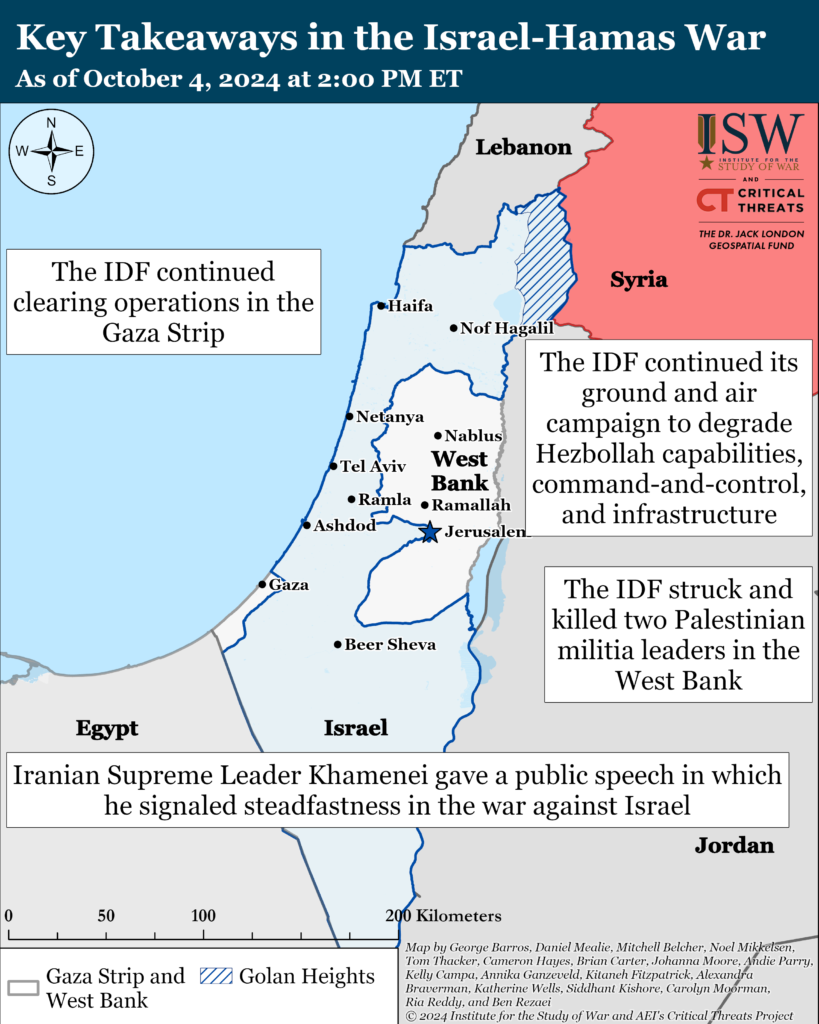
Gaza Strip
Axis of Resistance objectives:
Erode the will of the Israeli political establishment and public to sustain clearing operations in the Gaza Strip
Reestablish Hamas as the governing authority in the Gaza Strip
The IDF 143rd, 162nd, 252nd divisions continue to operate within the Gaza Strip.[l] The IDF stated on October 4 that these divisions continue to destroy militia fighters and infrastructure, including underground tunnels, through airstrikes and raids. The 162nd and 252nd divisions are currently deployed to Rafah and along the Netzarim Corridor, respectively.[li]
The National Resistance Brigades mortared Israeli forces south of the Netzarim Corridor on October 4.[lii]
Hamas stated on October 3 that it conducted a three-stage attack targeting Israeli armor east of Khan Younis near the Israel-Gaza Strip border.[liii] Hamas also detonated a minefield targeting Israeli engineers in the same area.
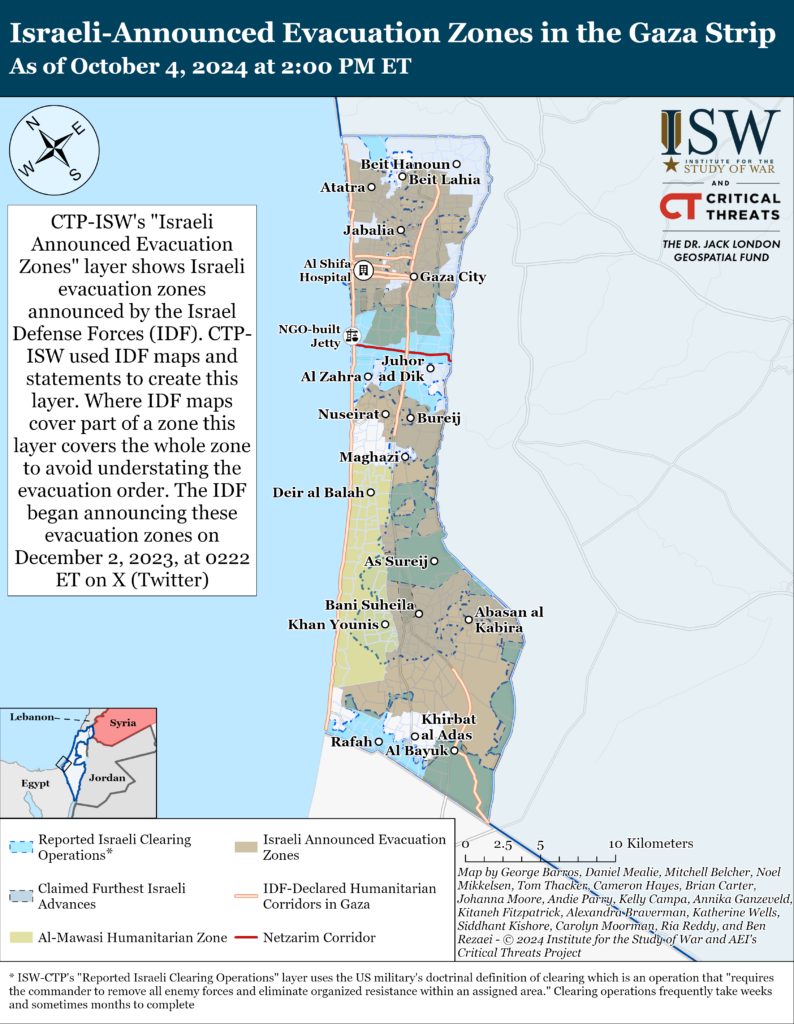
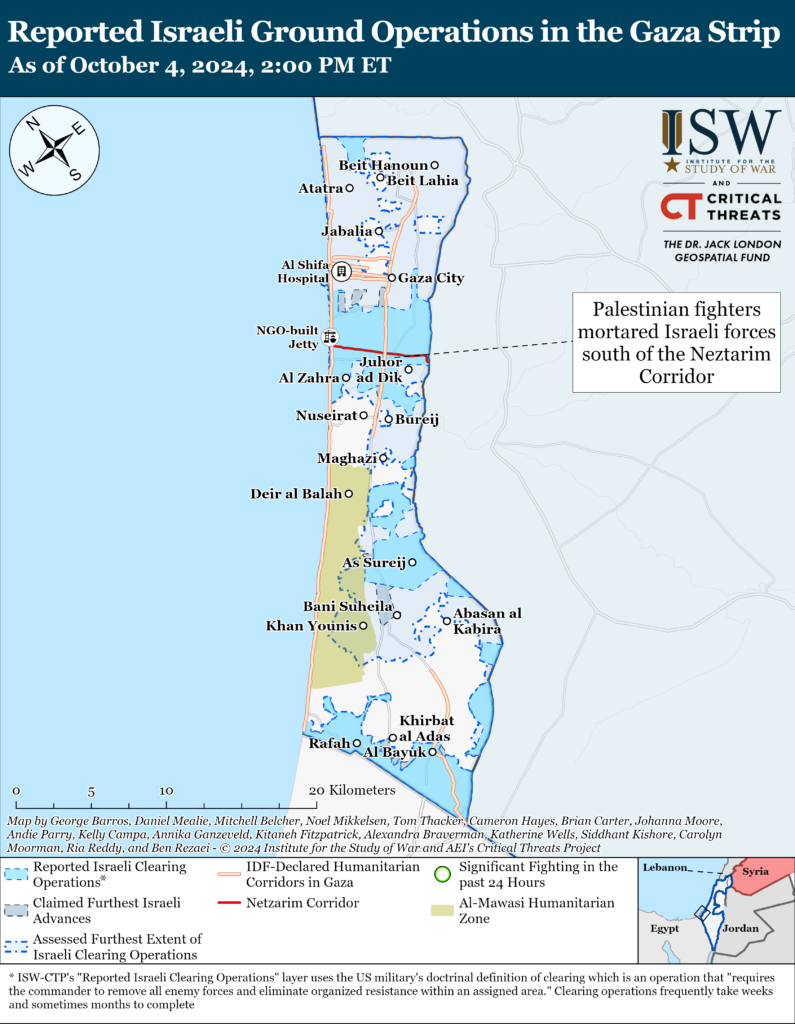
The Popular Front for the Liberation of Palestine claimed an indirect fire attack into southern Israel on October 4.[liv]
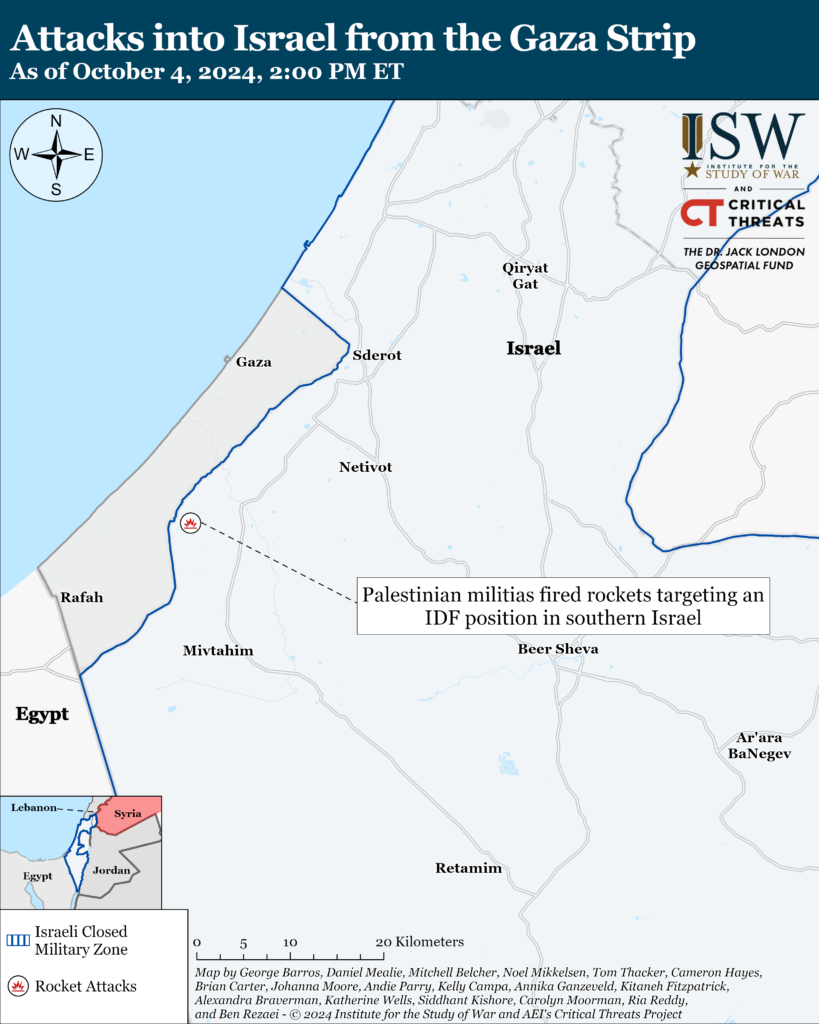
Recorded reports of attacks; CTP-ISW cannot independently verify impact.
West Bank
Axis of Resistance objectives:
Establish the West Bank as a viable front against Israel
An IDF conducted an airstrike targeting Palestinian militia commanders in the Tulkarm refugee camp on October 4.[lv] The strike killed Hamas Tulkarm commander Zaher Yasser Aoufi.[lvi] Aoufi reportedly planned and led an attempted bombing attack in Ateret in September 2024.[lvii] The IDF called Aoufi’s killing a ”significant assassination” due to his role in the West Bank militia network.[lviii] The strike also killed Palestinian Islamic Jihad commander Ghaith Badie Radwan, whom the al Aqsa Martyrs‘ Brigades also claimed as a former leader[lix] The IDF stated that the fighters were gathered to plan an ”immediate” attack against Israel.[lx] The IDF added the strike killed at least seven militants. The al Aqsa Martyrs‘ Brigades stated that the Israeli airstrike killed 19 people[lxi][lxii] Palestinian militias widely condemned the strike and called for additional operations against Israel.[lxiii]
Northern Israel and Lebanon
Axis of Resistance objectives:
Deter Israel from conducting a ground operation into Lebanon
Prepare for an expanded and protracted conflict with Israel in the near term
Expel the United States from Syria
Lebanese Hezbollah conducted at least 19 attacks into northern Israel since CTP-ISW’s last data cutoff on October 3.[lxiv] See the topline section for more information.
Iran and the Axis of Resistance
The United States and United Kingdom struck Houthi targets in at least five locations in Yemen on October 4. Unspecified US officials told the Associated Press that US and UK aircraft and ships conducted strikes on seven targets at Hodeida International Airport and the Katheib area, four strikes in Seiyana, Sanaa, and two strikes in Dhamar Province.[lxv] These strikes follows the Houthis firing 23 ballistic and cruise missiles at three US destroyers near the Bab al Mandeb Strait on September 27.[lxvi]
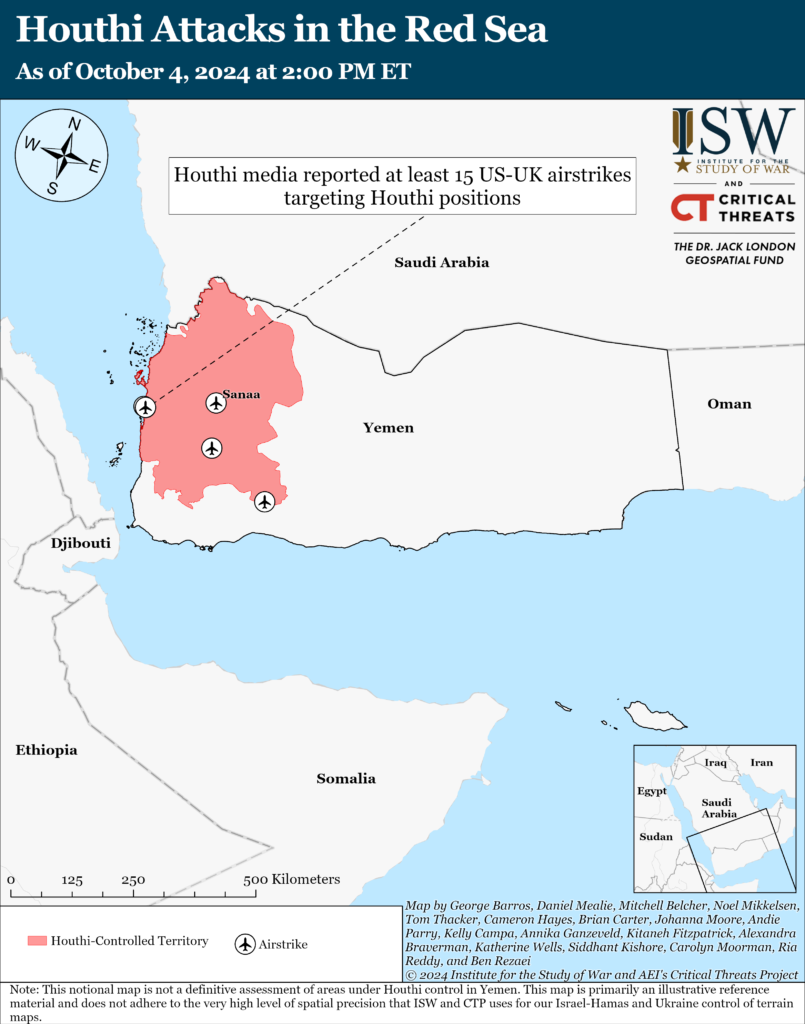
IRGC Deputy Commander Brigadier General Ali Fadavi threatened on October 4 to strike Israeli energy infrastructure in response to any Israeli strike on Iran.[lxvii] Fadavi emphasized that Iran is a large and vast country with numerous economic centers, while Israel has only three power plants and a few refineries which Iran can target all at once.[lxviii] Fadavi’s threat comes amid similar threats from other senior Iranian military officials in recent days.
 Eurasia Press & News
Eurasia Press & News
